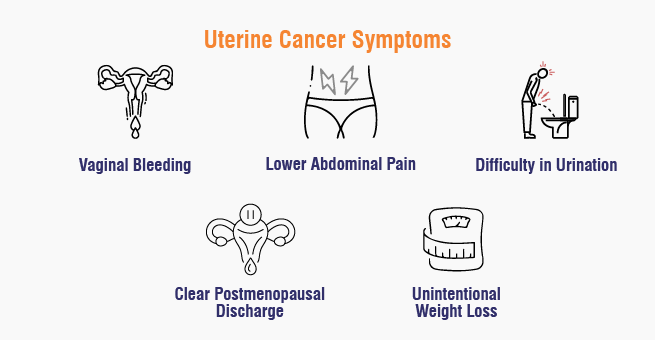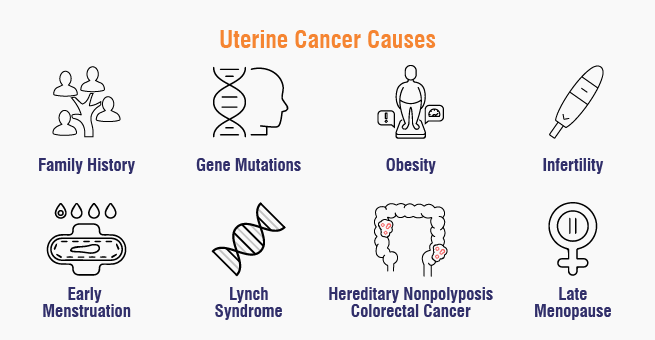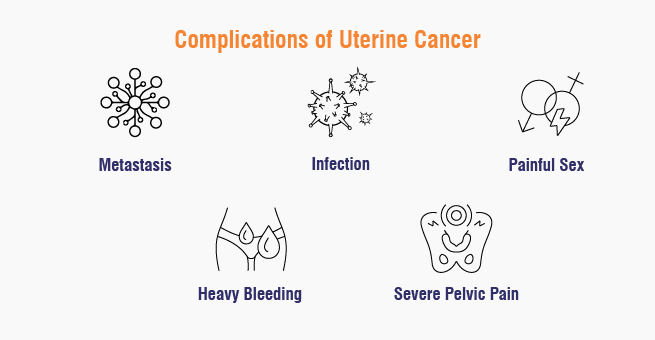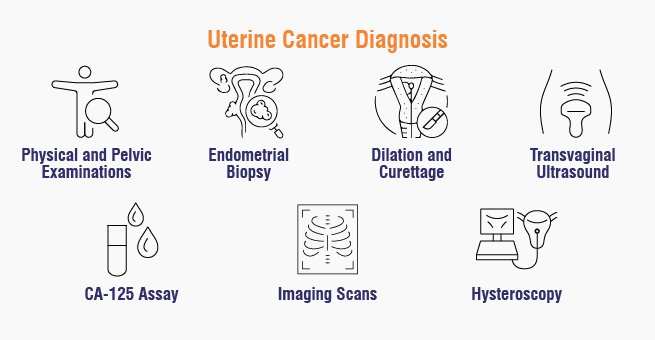Uterine Cancer: Need to Know About Symptoms, Causes, and Treatments
Uterine cancer, additionally known as womb cancer or endometrial cancer, is a form of cancer that starts in the mucosal layer of the uterus. It is among the most common gynecological cancers, with millions of women suffering from it around the globe. Though uterine cancer might be severe, prompt identification and management usually result in positive results. This blog will highlight certain aspects of uterine cancer, such as signs and contributory factors as well as methods employed for the diagnosis and treatment of uterine cancer.
Overview of Uterine Cancer
Uterine cancer is a term that encompasses two forms: endometrial cancer, which happens in the endometrium, and uterine sarcoma, which develops in the myometrium, or muscle wall, of the uterus. These two forms of gynecologic cancer are frequently found among women.
Uterine cancer is a form of cancer that occurs due to an uncontrolled DNA mutation in the cells of the uterus. It usually develops in the inner lining or muscles of the uterus. When it is diagnosed early and treatment is administered appropriately, uterine cancer can be cured. In most cases, surgical removal of the uterus is one of the first lines of treatment given to patients with uterine cancer.
Uterine cancer is also sometimes known as endometrial cancer and ranks sixth among various cancers affecting women worldwide. In India, uterine cancer accounts for about 2.5 percent of all reported cases, though its incidence rate shows a rapid increase, making it the leading cause of female cancers in India.
Uterine Cancer Types
Uterine cancer is of mainly two types:
- Endometrial cancer: Endometrial cancer originates from a part of the uterus called the endometrium. It is known to be the most frequent type of cancer affecting women’s reproductive systems and is treatable in most cases. It is common in most cases.
- Uterine sarcoma: Uterine sarcomas develop in the uterus’s myometrium, which is its muscle wall. They are rare and often more aggressive, and they are also harder to treat than other types of tumors found in the uterus.
Uterine Cancer Symptoms
Some of the common uterine cancer signs and symptoms include:
- Vaginal bleeding before menopause.
- Lower abdominal pain or cramping at the pelvis.
- Vaginal bleeding or spotting postmenopause.
- Thin white or clear vaginal discharge postmenopausal.
- Extremely prolonged, heavy, and frequent vaginal bleeding is common for older individuals.
- Difficulty urinating.
- Unintentional weight loss.

Uterine Cancer Causes
The exact cause of uterine cancer is not known to researchers. This is caused by changes in cells within the uterus. Mutated cells proliferate uncontrollably, resulting in a lump known as a tumor. Some of the common risk factors that might develop uterine cancer in women are:
- Older age
- Family history of breast or uterine cancers.
- Late menopause after age 50
- Long menstruation span
- High-fat diets
- Obesity
- Lynch syndrome or hereditary nonpolyposis colorectal cancer (HNPCC)
- Infertility
- Early menstruation before age 12
- Radiation therapy to the pelvis can damage cell DNA, increasing the risk of developing a second type of cancer.
- Estrogen replacement therapy (ERT) without progesterone
- Diabetes and certain ovarian diseases

Complications of Uterine Cancer
If left untreated or not diagnosed early, uterine cancer might develop some complications, such as:
- Metastasis (tumor migration)
- Infection
- Painful sex
- Heavy bleeding
- Severe pelvic pain
- Death (it occurs rarely if left untreated or gets severe)

Uterine Cancer Stages
Uterine cancers have stages that range from I to IV:
- Stage I cancer is still localized to the uterus.
- Stage II cancer has metastasized to the cervix.
- Stage III cancer has metastasized to the vagina, ovaries, and/or lymph nodes.
- Stage IV cancer has metastasized to the bladder or other organs far from the uterus.
Note: In certain instances, the gynecologist may lack the means to know the particular stage of the cancer afflicting patients until they undergo an operation to have it taken out.
Uterine Cancer Diagnosis
There are a few diagnostic tests that are performed to confirm uterine cancer, such as:
- Physical and pelvic examinations: The physical examination is done to identify the swellings in the abdomen and pelvis.
- CA-125 assay for blood tests: These are suggested to assess general health and inform treatment decisions.
- Ultrasounds, CT scans, and MRI scans: These imaging tests are to produce accurate results regarding the uterus and pelvic area.
- Transvaginal ultrasound for uterine imaging: The transducer wand is pushed into the vagina for detailed examination.
- Endometrial biopsy: This is done for uterine tissue removal.
- Hysteroscopy: This gives detailed uterine images.
- Dilation and curettage (D&C): This is done to obtain uterine tissue surgically.
Note: When a doctor diagnoses endometrial cancer, it is also necessary for him or her to ascertain its type. Understanding this aids in taking assertive measures on how best to treat it:
- Type 1 endometrial cancers are less aggressive and do not tend to metastasize rapidly.
- Type 2 endometrial cancers tend to be more aggressive, spread beyond the uterus, and require more active treatment.

Uterine Cancer Treatment
Typically, surgical removal of the tumor is the initial approach for treating endometrial cancer. Options might consist of uterus, fallopian tubes, and ovary excisions. Chemotherapy or radiation therapy could be other alternatives for managing cancerous cells. The choice of treatment for endometrial cancer will depend on its stage, general health status, and personal preferences. The treatment methods include:
- Surgery: The most common procedure used in treating endometrial cancer is a hysterectomy. This involves taking out both the uterus and fallopian tubes. The other associated procedure is salpingo-oophorectomy, which takes away the ovaries, stopping any chances of conceiving children. In some circumstances, it becomes necessary for the surgeon to check for indications of extended malignancy within adjacent areas and do lymph node transferral for analysis to evaluate the level of cancer respectability.
In general, hysterectomy is of four types: total abdominal, vaginal, radical, and minimally invasive. The surgeon makes incisions in the abdomen, vagina, cervix, or both.
Hysterectomy typically includes two additional procedures: bilateral salpingo-oophorectomy (BSO), which removes ovaries and fallopian tubes, and lymph node dissection, which removes lymph nodes.
Uterine cancer can be treated by the following nonsurgical approaches in some cases:
- Chemotherapy: Using strong medicines, killing cancer cells is possible through the introduction of drugs.
- Radiation therapy: Strong radiation rays are utilized here to destroy all uterine cancer cells.
- Hormone therapy: This involves severing their connection with cancer cells so as to inhibit the continuation of the ailment’s development.
- Targeted therapy: This helps inhibit DNA mutations through the intake of effective medication.
- Immunotherapy: In this phase, the body’s immune system is enhanced in an attempt to eliminate tumors caused by cancer.
Sometimes, the above-discussed approaches can also be paired with uterine cancer surgery.
Conclusion
Uterine carcinoma in general is a serious disease, but the good news is that it can be cured if diagnosed early enough. With regular check-ups, especially for women who have high-risk factors, diagnosis at an early stage and treatment success can be greatly improved. Any abnormal bleeding, pelvic pain, or menstrual changes should prompt one to visit the gynecologist immediately. The earlier one finds out about it and acts on the findings, the better their chances are of surviving uterine carcinoma.
Uterine cancer can be diagnosed, treated, and prevented comprehensively at Yashoda Cancer Institute. The institute employs skilled gynecologists, oncologists, hemato-oncologists, radiologists, genetic counselors, and nutritionists who are well-known both in India and abroad. It aims to deliver complete medical and surgical therapeutics with skilled cancer care. Yashoda Cancer Institute is one of the leading centers of excellence for cancer treatment in India. The institute offers dedicated and comprehensive cancer diagnosis and treatment across four independent hospitals located in Hitech City, Somajiguda, Secunderabad, and Malakpet.
References:
About Author –




















 Appointment
Appointment WhatsApp
WhatsApp Call
Call More
More

